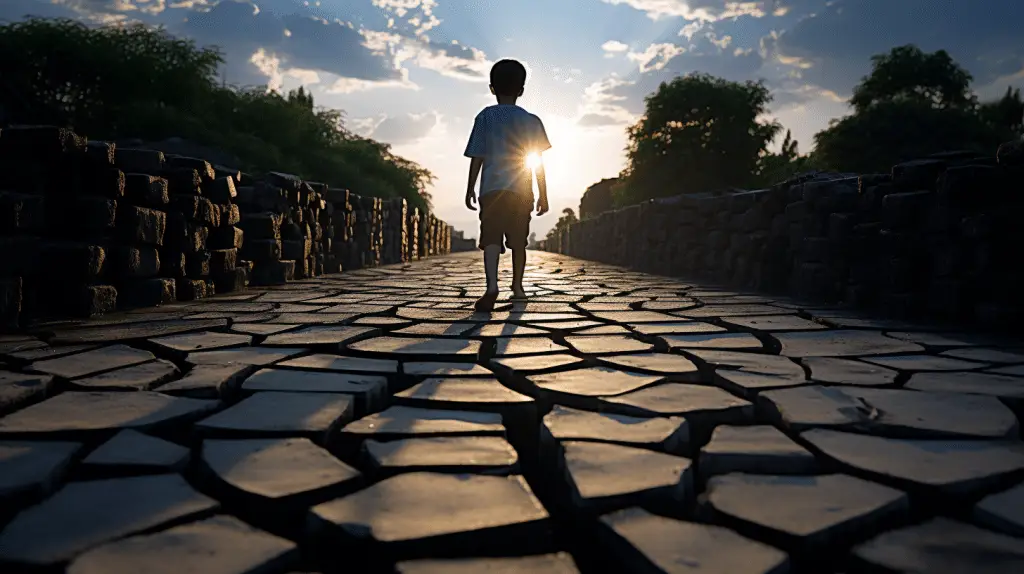The saying “If you step on a crack, you will break your mother’s back” is a well-known superstition that has been around for generations. The belief is that if someone steps on a crack in the pavement or sidewalk, it will cause harm to their mother’s spine. While the origin of this superstition is unclear, it has been a popular belief among children and adults alike.

Many people believe that this superstition is just a harmless game or rhyme, but others take it more seriously and avoid stepping on cracks altogether. Some variations of the superstition even suggest that the number of cracks stepped on can indicate the number of bones that will be broken in the mother’s back. While there is no scientific evidence to support this belief, it continues to be a popular superstition in many cultures.
Despite the lack of evidence, the “If you step on a crack, you will break your mother’s back” superstition remains a popular topic of discussion. Whether it is taken seriously or just seen as a fun game, many people continue to believe in the power of this superstition. In this article, we will explore the origins and variations of this superstition and examine why it has remained so popular over the years.
Origins of the Rhyme

The origin of the rhyme “If you step on a crack, you will break your mother’s back” is not entirely clear. It is believed to be a children’s game that has been passed down through generations. The rhyme is often used to warn children to be careful when walking on the sidewalk or pavement, as stepping on a crack could lead to their mother’s back being broken.
According to the Farlex Dictionary of Idioms, the phrase “step on a crack” is a superstitious belief that dates back to the early 20th century. It is thought to have originated in the United States, although its exact origins are unknown.
The rhyme has been included in various forms of popular culture, including movies and literature. In the 1988 children’s movie “The Land Before Time,” the character Ducky says, “Don’t step on a crack, or you’ll fall and break your back.” This shows how the rhyme is used in child’s play.
The phrase “step on a crack, break your mother’s back” has also been included in A.A. Milne’s poem “Lines and Squares.” However, according to Opie’s description, it was a more widespread superstition than the racial one.
In conclusion, the origins of the rhyme “If you step on a crack, you will break your mother’s back” are not entirely clear. It is believed to be a children’s game that has been passed down through generations. The phrase has been included in various forms of popular culture, including movies and literature.
Understanding the Rhyme
The rhyme “If you step on a crack, you will break your mother’s back” is a popular children’s rhyme that has been passed down through generations. The rhyme is often used as a warning to children to be careful where they step.
The origins of the rhyme are unclear, but it is believed to have originated in the United States. Some sources suggest that the rhyme may have originated as a superstition that stepping on a crack would bring bad luck. Others suggest that the rhyme may have been created as a way to teach children to be careful and avoid dangerous situations.
The rhyme has several variations, including “Step on a line, you’ll break your father’s spine” and “Step in a ditch, your mother’s nose will itch.” These variations are often used to add humor to the rhyme and make it more engaging for children.
Despite its popularity, there is no scientific evidence to suggest that stepping on a crack can actually break someone’s back. However, the rhyme may have some basis in reality. For example, if someone were to step on a loose or uneven surface, they could lose their balance and fall, potentially injuring themselves.
In some variations of the rhyme, the phrase “weeper” is used instead of “mother’s back.” This may be a reference to the belief that stepping on a crack could cause someone to cry or weep.
Overall, the rhyme “If you step on a crack, you will break your mother’s back” is a popular and enduring children’s rhyme that has been passed down through generations. While it may not have any basis in reality, it serves as a warning to children to be careful where they step.
Interpretation and Superstition

The superstition that stepping on a crack will break your mother’s back is a well-known childhood rhyme that has been passed down through generations. While the origin of this superstition remains unclear, it is believed to have originated in a time when people believed in the power of magic and superstition.
Many people believe that this superstition is just a fun childhood rhyme, but others believe that it is a bad omen and that bad luck will follow if you step on a crack. Some people even believe that bad things come in threes and that stepping on a crack is the first of three bad things that will happen to you.
The superstition surrounding stepping on a crack is a superstitious belief that has been passed down through generations. While it may seem harmless, some people take it very seriously and believe that it can bring bad luck and misfortune.
Overall, the superstition surrounding stepping on a crack is a fun childhood rhyme that has been passed down through generations. While some people take it seriously, others see it as just a harmless superstition. Regardless of what you believe, it is important to remember that superstitions are just beliefs and that they do not have any real power or influence over our lives.
The Game and Its Rules
“If you step on a crack, you will break your mother’s back” is a popular game played by kids on playgrounds. It is a game of tag that involves avoiding stepping on cracks on the ground while walking. The game has its own set of rules that the players must follow.
The objective of the game is to avoid stepping on any cracks while walking on sidewalks or roads. If a player steps on a crack, they are out of the game. The last player standing is declared the winner.
The game is similar to other playground games such as Red Rover, but it is unique in its own way. It requires players to be careful and aware of their surroundings while walking.
The game is typically played by children, but adults can also participate. It is a fun and simple game that can be enjoyed by anyone.
Overall, “If you step on a crack, you will break your mother’s back” is a classic game that has been played for generations. It is a game that promotes awareness and carefulness while walking, making it a great activity for kids and adults alike.
Cultural Significance and Impact
The proverb “If you step on a crack, you will break your mother’s back” is a childhood rhyme that has been passed down for generations. It is believed to have originated in the United States in the early 20th century and is still commonly recited by children today.
The cultural significance of this proverb lies in its association with the mother figure. It is a warning to children to be mindful of their actions and to avoid causing harm to their mothers. The proverb is also linked to the home and the neighborhood, as children are often playing outside and walking on the sidewalks where the cracks are located.
The impact of this proverb on children’s behavior is debatable. Some argue that it instills a sense of caution and respect for one’s mother, while others believe it perpetuates a superstitious belief that has no basis in reality. However, regardless of its actual impact on behavior, the proverb remains a part of childhood culture and folklore.
In addition to its cultural significance, the proverb has also been referenced in popular culture. It has appeared in books, movies, and television shows as a way to evoke nostalgia and childhood memories. The rhyme has even been used in scientific research, as a metaphor for understanding the behavior of cracks in concrete structures.
Overall, the proverb “If you step on a crack, you will break your mother’s back” has had a lasting impact on childhood culture and remains a popular rhyme among children today.
Related Rhymes and Sayings

The saying “Step on a crack, break your mother’s back” is just one of many rhymes and superstitions that children have been reciting for generations. Here are a few related rhymes and sayings that some may find interesting:
- “Rabbit, rabbit” is a common phrase that people say on the first day of each month for good luck. Some believe that saying “rabbit, rabbit” before anything else on the first day of the month will bring good luck for the rest of the month.
- “Ladybug, ladybug, fly away home” is a nursery rhyme that children have been singing for centuries. It is believed that reciting this rhyme will help ladybugs fly away to their home and not bother people.
- “Finders keepers, losers weepers” is a common saying that children use when they find something that belongs to someone else. It means that if you find something, you get to keep it and the person who lost it should not be upset.
These rhymes and sayings are just a few examples of the many superstitions and traditions that have been passed down through generations. While some may seem silly or outdated, they continue to be a part of many people’s lives and cultures.
Scientific Viewpoint

From a scientific viewpoint, there is no evidence to support the superstition that stepping on a crack will break your mother’s back. The idea that a small crack in the pavement could cause such a catastrophic injury is simply not plausible.
Cracks in the pavement are a common occurrence, and they can be caused by a variety of factors, including weather conditions, heavy foot traffic, and natural wear and tear. While it is true that cracks in the pavement can become larger over time, they are unlikely to cause any harm to a person who steps on them.
Furthermore, there is no evidence to suggest that the weather conditions or time of year have any impact on the likelihood of a crack causing harm. Whether it is a sunny summer day or a rainy autumn afternoon, the risk of a crack causing injury is negligible.
In fact, modern pavement technology has made sidewalks and other paved surfaces more durable than ever before. With proper maintenance, sidewalks can last for decades without significant deterioration.
In summary, while the superstition that stepping on a crack will break your mother’s back may be a fun childhood game, there is no scientific basis for it. Cracks in the pavement are a common occurrence, but they are unlikely to cause any harm to a person who steps on them. With modern pavement technology, sidewalks and other paved surfaces can last for decades without significant deterioration.
Informant’s Role

The role of the informant in the superstition “If you step on a crack, you will break your mother’s back” is crucial. The informant is typically a parent or an elder who passes on the belief to their children or younger generations. They may have learned it from their own parents or from their community.
The informant’s role is to instill a sense of caution and fear in children when walking on sidewalks or roads. By warning them of the consequences of stepping on a crack, the informant hopes to prevent them from doing so and potentially causing harm to their mother.
The informant may also use the superstition as a playful way to engage with children and make walking more fun. Children may enjoy the challenge of avoiding cracks and may feel a sense of accomplishment when successfully navigating a crack-filled sidewalk.
It is important to note that the informant’s role in perpetuating this superstition may vary depending on cultural and regional differences. In some communities, the superstition may not be as prevalent or may have a different meaning attached to it.
Overall, the informant’s role in the superstition “If you step on a crack, you will break your mother’s back” is to pass on a belief that promotes caution and safety while walking.
Potential Harm
While the childhood phrase “step on a crack, break your mother’s back” may seem harmless, it can actually have negative effects on a child’s mental health. The fear of causing harm to a loved one can be overwhelming and may lead to obsessive-compulsive behaviors, anxiety, and stress.
Additionally, the physical act of avoiding cracks in the pavement can lead to physical harm. Children may trip or fall while trying to avoid cracks, potentially leading to injuries such as sprains or broken bones.
It’s important for parents and caregivers to recognize the potential harm of this superstition and to encourage children to walk naturally and safely without fear of causing harm to others. By promoting a positive and rational mindset, children can develop healthy coping mechanisms and avoid unnecessary anxiety and stress.
In conclusion, while the phrase “step on a crack, break your mother’s back” may seem harmless, it can have negative effects on both mental and physical health. It’s important to promote a positive and rational mindset to avoid unnecessary anxiety and stress.
Steve is the creative force behind My Unique Tales, a blog dedicated to sharing captivating stories that explore the human experience in all its complexity. With a passion for writing and a talent for crafting engaging narratives, Steve's blog is a treasure trove of imaginative tales that transport readers to other worlds and challenge them to see things from new perspectives. From epic adventures to intimate character studies, Steve's stories are always thought-provoking and emotionally resonant. With a growing following of readers who appreciate his unique voice and creative vision, Steve is quickly becoming a rising star in the world of online storytelling.






